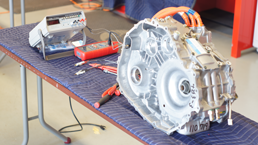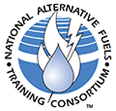A Basic Understanding of Battery-Electric and Hybrid-Electric Vehicles
This two-day course focuses on the basic concepts of battery electric vehicles.
The number of electric and hybrid vehicles is growing every year. Mandates such as the federal Energy Policy Act and the California Federal Pilot Program require most large fleets to include alternative fuel vehicles (AFVs) in ever-growing numbers. All of this means that the demand for AFV technicians is increasing dramatically. The AFV technician needs to know everything that is currently applicable to battery-electric and hybrid-electric vehicles, along with new technology to deal with the batteries, electric motors, controllers, and auxiliary equipment.
SCHEDULE A TRAINING or call us at ![]() (304) 293-7882 for more information.
(304) 293-7882 for more information.
Course materials provided:
- Participant Manual – ISBN 978-1-933954-30-1
- Includes review questions and learning activities
- Each module of the Participant’s Manual contains text, illustrations, explanatory figures and tables, module review questions, and a list of key terms and abbreviations
Course designed for:
- Automotive Technicians
- Fleet Managers
- Government Officials and Decision Makers
- Secondary Educators
- Consumers


Taught by certified NAFTC instructors, this two-day course will enable you to:
- Explain types of vehicles emissions, their impact on the environment, and health issues related to emissions.
- Discuss the impact of dependence on foreign oil on the U.S economy, the effects of supply and demand, and the impacts of foreign policy and a global fuel economy.
- Discuss the origins and history of early vehicles, recognizing early developments in electric vehicle technologies and their competition.
- Categorize personal, shop, and battery safety procedures into practices, explain battery safety and causes of dangers, and discuss warning labels and rating systems of fire extinguishers.
- Discuss vehicle safety systems, safety disconnects, safety interlock loops, and grounding, and explain correct procedures for maintenance of BEVs and HEVs.
- Identify basic propulsion systems and major systems of electric vehicles (EVs), identify the impact of battery characteristics, compare AC and DC motors, and compare reliability and economy of EVs in contrast to the gasoline engines.
- Discuss battery pack configurations, energy concepts and battery technology, battery chargers, and the electronic systems of the BEV/HEV.
- Discuss energy storage and consumption systems, energy source components, and two HEV design models, and compare and contrast the Internal Combustion Engine (ICE) and the HEV/ICE.
- Discuss EV test equipment, compare onboard diagnostic equipment with hand-held equipment and techniques for maintenance, and discuss test procedures for batteries, controllers, and motors.
- Explain maintenance procedures for non-OEM EVs and HEVs through knowing timetables and features, and discuss troubleshooting techniques through sequential diagnostic models’ and recognizing system of substandard vehicles performance.
Course outline:
- Day One
- Why do we need alternative fuels?
- Legislation on air quality
- History of electric and hybrid vehicles
- Electric and hybrid vehicle safety
- Electric vehicle technology and components
- Day Two
- Electric vehicle technology and components
- Maintenance and troubleshooting
- Ignition requirements and controls
- Combustion and engine design




